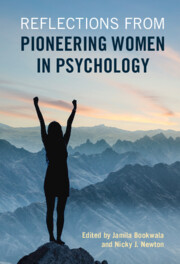Book contents
- Reflections from Pioneering Women in Psychology
- Reflections from Pioneering Women in Psychology
- Copyright page
- Contents
- Contributors
- Foreword
- Acknowledgments
- Introduction
- Chapter 1 Hardly a Straight Line
- Chapter 2 Challenging Paradigms
- Chapter 3 From Young and Naïve to Old and Experienced
- Chapter 4 Being the Change You Want to See in the World
- Chapter 5 Accidental Professor
- Chapter 6 Finding a Place and Changing the Space
- Chapter 7 The More You Do, the Better It Gets
- Chapter 8 Happily Ever After
- Chapter 9 Love and Work
- Chapter 10 Overcoming Obstacles and Thriving
- Chapter 11 Out of the Box
- Chapter 12 Stress Has Been Good to Me
- Chapter 13 On Pioneering at Northwestern University… With a “Village” of Supports
- Chapter 14 Against All Odds
- Chapter 15 Tricked by Memory
- Chapter 16 Doing Psychology in Unsettled Times
- Chapter 17 Overcoming Obstacles
- Chapter 18 Knocking on Doors that Opened for Me
- Chapter 19 Paths Unexpected, but Rewarding, during an Academic Journey
- Chapter 20 Reflections on an Improbable Journey
- Chapter 21 The Delicate Art of Balancing Serendipity and Planfulness in an Academic Career
- Chapter 22 A “Skin in the Game” Scaffolded Career Path
- Chapter 23 A Wonderful Journey Along an Unforeseen Path
- Chapter 24 Choosing Both
- Chapter 25 Identity and My Life Story in Psychology
- Chapter 26 Doing What Matters: A Framework for Academic Success
- Conclusion
- Index
- References
Conclusion
Reflecting on the Collective
Published online by Cambridge University Press: 09 April 2022
- Reflections from Pioneering Women in Psychology
- Reflections from Pioneering Women in Psychology
- Copyright page
- Contents
- Contributors
- Foreword
- Acknowledgments
- Introduction
- Chapter 1 Hardly a Straight Line
- Chapter 2 Challenging Paradigms
- Chapter 3 From Young and Naïve to Old and Experienced
- Chapter 4 Being the Change You Want to See in the World
- Chapter 5 Accidental Professor
- Chapter 6 Finding a Place and Changing the Space
- Chapter 7 The More You Do, the Better It Gets
- Chapter 8 Happily Ever After
- Chapter 9 Love and Work
- Chapter 10 Overcoming Obstacles and Thriving
- Chapter 11 Out of the Box
- Chapter 12 Stress Has Been Good to Me
- Chapter 13 On Pioneering at Northwestern University… With a “Village” of Supports
- Chapter 14 Against All Odds
- Chapter 15 Tricked by Memory
- Chapter 16 Doing Psychology in Unsettled Times
- Chapter 17 Overcoming Obstacles
- Chapter 18 Knocking on Doors that Opened for Me
- Chapter 19 Paths Unexpected, but Rewarding, during an Academic Journey
- Chapter 20 Reflections on an Improbable Journey
- Chapter 21 The Delicate Art of Balancing Serendipity and Planfulness in an Academic Career
- Chapter 22 A “Skin in the Game” Scaffolded Career Path
- Chapter 23 A Wonderful Journey Along an Unforeseen Path
- Chapter 24 Choosing Both
- Chapter 25 Identity and My Life Story in Psychology
- Chapter 26 Doing What Matters: A Framework for Academic Success
- Conclusion
- Index
- References
Summary
In the concluding chapter, Bookwala and Newton reflect on the women featured in this volume as a collective, highlighting commonalities in their experiences, strengths, and influence as psychologists. These pioneers, who stand on the shoulders of other women who entered psychology decades earlier, have had distinguished careers and have transformed their fields, institutions, and academia through their contributions and accomplishments. Using theoretical frameworks and key constructs within life span development, Bookwala and Newton weave together a tapestry to explain these remarkable women’s journeys as trailblazers and paradigm changers in a climate and environment in academia that was unwelcome and even hostile to women. Bookwala and Newton also use their concluding chapter to situate the volume in the COVID-19 pandemic, which has had a profound and disproportionate impact on the professional and personal lives of women scholars: an impact that could be prolonged, and that risks undermining the very strides in gender equity that the contributors in this volume fought so hard for and won.
- Type
- Chapter
- Information
- Reflections from Pioneering Women in Psychology , pp. 342 - 352Publisher: Cambridge University PressPrint publication year: 2022



